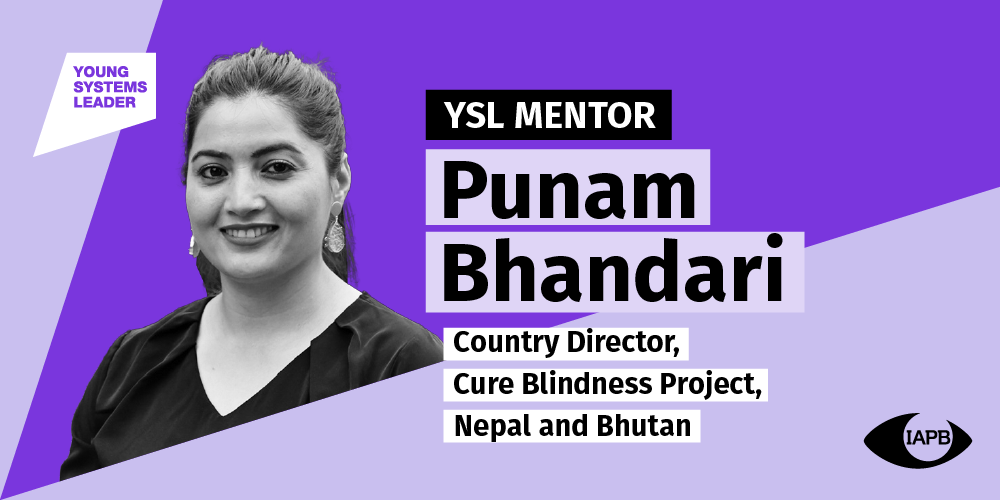Join a powerful, unprecedented alliance for better eye health for all.
Join IAPB-
Choose an alternate language here

Punam Bhandari is Country Director for Cure Blindness Project for Nepal and Bhutan and is based in Kathmandu, Nepal. Last year, she was one of the 2024 IAPB Young Systems Leader award winners. She spoke to IAPB about her experience of the award, and how she is looking forward to supporting this year’s award winners in Nepal.
Last year you were one of the first cohort of IAPB Young Systems Leader award winners. Can you tell us a bit about your experience of participating in the award programme?
It was an amazing experience! I felt like I was gaining incredible connections and networks through this recognition. More than anything, it reinforced that the work I’m doing is truly making an impact in society. It also came with a great responsibility to come back and contribute even more to the fight against avoidable blindness, restoring sight, and changing lives. Additionally, I had the opportunity to meet many friends from different countries who are doing similar work. It was truly inspiring to connect with peers working in different geographies, sharing experiences, and learning from each other. The entire experience was both a great pleasure and a huge motivation to keep pushing forward.
What has been the focus of your work in the last 8 months since we saw you in Mexico City?
Since our meeting in Mexico City, my focus has been on expanding and deepening the impact of the Cure Blindness Project in the countries we are working. Specifically, I’ve been involved in key initiatives across Nepal and Bhutan, including program compliance, strategic planning, and fostering collaboration with both local and international partners. We’ve made significant strides in areas such as paediatric eye care, expanding cataract surgeries, continuing research initiatives like the RARE survey in Nepal, expanding sub-specialty units, and enhancing primary eye care services in partnership with local governments and other partners. Additionally, there has been a strong emphasis on strengthening eye health systems, capacity building, and developing sustainable infrastructure, including referral centres to address avoidable blindness. I’ve also been actively involved in strategic planning for both countries, focusing on the development of national eye health strategies and action plans for Bhutan, as well as a five-year organizational country strategy for Nepal.
What changes would you like to see in Global Eye Health? How do you think we can drive progress?
In global eye health, I would like to see a stronger focus on integrating eye care into broader health systems, particularly in low-resource settings. This integration would ensure that eye health becomes a routine part of healthcare, making essential services accessible to everyone. Additionally, I hope to see increased investment in primary eye care, where community health workers can play a central role in identifying and referring cases early, preventing avoidable blindness, and developing robust referral systems.
To achieve this, we can foster deeper collaboration between governments, NGOs, the private sector, and local communities. By aligning our efforts and pooling resources, we can create sustainable and impactful solutions that reach the most underserved populations.
Leveraging technology and innovation will be crucial in driving progress. AI-based screenings, telemedicine, and mobile health platforms can significantly expand the reach of eye care services, particularly in remote areas. Furthermore, advocacy and education campaigns are essential for raising awareness, garnering support, and securing the necessary resources to prioritize eye health on global agendas.
By focusing on sustainability, building local capacity, and strengthening partnerships, we can make meaningful strides in improving access to eye care and ultimately reducing preventable blindness worldwide.
What recommendations will you give to this year’s Young Systems Leader award winners to make the most of their time at 2030 INSIGHT LIVE and in Kathmandu?
I would like to first congratulate you, as being selected already reflects the great work you are doing and the impact you are making in the community by changing lives. I also encourage you to make the most of this event—engage actively in all activities, utilize this platform to expand your network, and build relationships with your peers. Share your insights, learn from diverse perspectives, and keep an open mind. Finally, after the event, stay connected with peers and mentors, follow up on collaborations, and keep the momentum going to ensure you continue making a meaningful impact in global health systems.